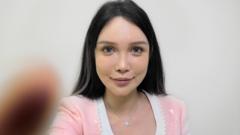Many women suffering from polycystic ovary syndrome (PCOS) are turning to social media influencers selling unproven remedies as they seek solutions for their condition. Influencers like Kourtney Simmang and Tallene Hacatoryan market expensive tests and dietary supplements while spreading misinformation about existing medical treatments, leaving vulnerable patients at risk for worsening symptoms and health complications.
The Dangers of Health Misinformation: Influencers Selling PCOS Remedies

The Dangers of Health Misinformation: Influencers Selling PCOS Remedies
A growing number of influencers are capitalizing on the struggles of women with polycystic ovary syndrome (PCOS) by promoting unverified treatments and supplements, leading to potential harm.
Influencers are increasingly selling unverified health remedies for polycystic ovary syndrome (PCOS), a hormonal disorder affecting one in ten women. Amidst limited effective medical solutions, many women feel compelled to seek alternatives due to frustration with their symptoms, including painful periods and weight gain. One such case is Sophie, who spent almost a year following a program devised by influencer Kourtney Simmang, which promised to treat the "root cause" of PCOS—despite the fact that no such cause has been identified.
Sophie, after spending thousands on this program and additional supplements, found no improvement in her symptoms, stating, "I left the program with a worse relationship to my body and food." Medical professionals like Dr. Jen Gunter express concern over unqualified individuals operating as health coaches, pointing out the clinical limitations of the tests they promote.
Research indicating that as many as 70% of women with PCOS go undiagnosed underlines the desperation many feel for legitimate help. Influencers often exploit this gap, propagating misleading claims that dietary changes or supplements can cure the condition. Dr. Gunter warns, "Whenever there’s a gap in medicine, predators take advantage."
Notably, social media platforms are a breeding ground for such misinformation. In a recent analysis by the BBC, half of the most popular PCOS-related content on platforms like TikTok and Instagram included inaccuracies. Influencers often promote drastic diets that lack scientific support while disparaging traditional treatments like birth control pills, even though they are effective for many individuals with PCOS.
The story of Amy from Northern Ireland reflects the frustration faced by women. After following the advice of influencer Tallene Hacatoryan, who tells followers to avoid certain foods and consider high-fat diets, Amy experienced adverse effects. "It makes you feel like you failed," she recounted, reflecting how misleading rhetoric leads to feelings of inadequacy.
In response to the misinformation crisis, advocates for women's health emphasize the importance of seeking evidence-based treatment from qualified professionals rather than relying on influencers. Medlyn, a medical student from Nigeria, is working to reduce stigma associated with PCOS and encourages women to pursue medically sound treatment choices.
PCOS remains a complex and often misunderstood condition. Experts suggest women struggling with the disorder seek specialized care to find effective management options. While health influencers might provide community and support, the danger lies in their potential to mislead vulnerable patients seeking genuine relief.



















